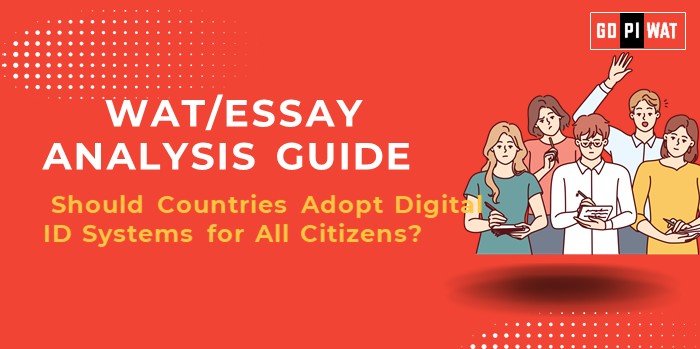📋 Written Ability Test (WAT)/Essay Analysis Guide: Should Countries Adopt Digital ID Systems for All Citizens?
🌐 Understanding the Topic’s Importance
Digital IDs represent the intersection of technology and governance, addressing global challenges like economic inclusion and fraud. However, issues like privacy and accessibility create a complex narrative, making it a compelling B-school discussion topic.
🕒 Effective Planning and Writing
- Time Allocation:
- Planning: 5 minutes
- Writing: 20 minutes
- Review: 5 minutes
- Word Count Distribution:
- Introduction: 60 words
- Body: 350 words
- Conclusion: 90 words
✍️ Introduction Techniques for Essays
- 🟡 Contrast Approach: “While Estonia sets global benchmarks with its e-ID, countries like Kenya struggle with implementation challenges, illustrating the duality of digital ID adoption.”
- 🟢 Solution-Based: “Digital IDs, when implemented inclusively, can revolutionize access to services while addressing fraud and inefficiency.”
- 🔵 Timeline Introduction: “Since 2002, digital ID systems have evolved globally, with 90+ countries adopting them to varying degrees of success.”
📚 Structuring the Essay Body
- Achievements: Highlight successes, such as fraud reduction (Estonia) and increased financial inclusion (India).
- Challenges: Address risks like data breaches, emphasizing the need for strong legal frameworks.
- Future Outlook: Suggest measures like public-private partnerships and privacy-focused innovations.
📜 Concluding Effectively
- ⚖️ Balanced Conclusion: “Digital IDs are transformative tools with significant potential but require careful planning to address inclusivity and security.”
- 🌍 Global Comparison Conclusion: “From Estonia to India, the digital ID journey underscores a global trend toward technology-driven governance, despite persistent challenges.”
🔑 Recommendations for Sustainable Progress
- 🔒 Strengthen cybersecurity frameworks.
- 🤝 Promote inclusivity through accessible infrastructure.
- 🌐 Foster global partnerships for interoperability.
📝 Sample Short Essays (100 Words Each)
- ⚖️ Balanced Perspective: “Digital IDs are revolutionizing governance and inclusion but raise questions of privacy and implementation gaps.”
- 🟢 Solution-Oriented: “Stronger privacy laws and infrastructure investments can bridge the digital divide, making digital IDs universally beneficial.”
- 🌍 Global Comparison: “Estonia’s success with e-IDs provides a roadmap for countries like India to enhance security and accessibility in digital governance.”


